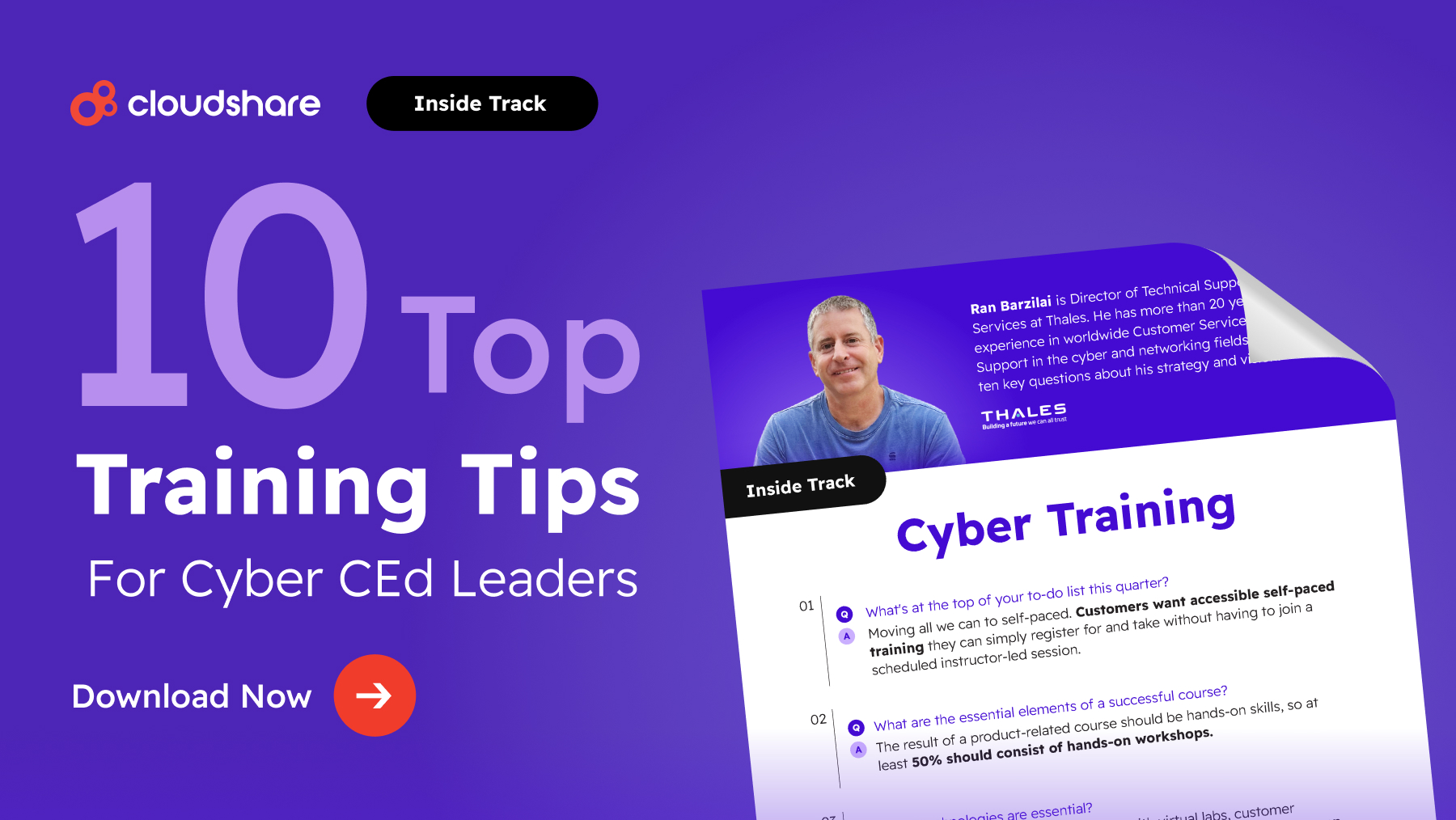
Every industry implements sales training. The more complex the industry, the more difficult it is to network—and the more critical sales training is.
Sales training isn’t just endless slideshows and technical documents. Sales training requires a certain threshold of understanding. Sales teams need to know their service offerings, just like the individuals, groups, or organizations that create these offerings.
Sales teams must take an extra step to explain these products and services to clients who do not share their in-depth knowledge. And when it comes to cybersecurity sales training, doing is almost always better than showing.
That’s why virtual IT labs are a powerful tool that your cybersecurity sales teams can leverage to provide personalized demos to customers, partners, and other stakeholders.
The Importance of Cybersecurity Sales Training
Cybersecurity is essential and affects every employee in every department, especially in sales. Trained sales engineers create capable sales teams, especially considering how complex and confusing cybersecurity can be.
While we think of cybersecurity as a separate field now, it emerged from computer science, which itself emerged from a combination of electrical engineering, mathematics, physics, and chemistry!
Increase Training Outcomes with an Effective Cybersecurity Sales Strategy
Sales training requires two things to be successful: effort and time.
You can measure time in terms of how quickly a solution can be implemented and tweaked, or how long it takes for employees to tackle the learning curve associated with adopting new technologies.
Effort can be measured by how difficult it is for employees to implement solutions, especially complex ones that require advanced or specialized knowledge to operate.
With increasingly standardized training solutions such as those delivered through virtual labs, training can happen anywhere: during your commute, in the office, or even at home. Remote learning isn’t just becoming more popular—it’s also becoming more productive.
How to Sell Cybersecurity
Cybersecurity’s a hot topic — but it’s not exactly a happy one. The modern cybersecurity landscape can be more than a little unsettling, especially when you realize just how many bad actors are out there and how much more sophisticated they’ve gotten. The good news is that this makes for a very easy cyber security sales pitch.
After all, by now, most people understand that cybersecurity is more or less non-negotiable, even if small businesses do still have a tendency to underestimate their risk level. This means that you probably won’t need to spend much time convincing prospects that security is important.
You can instead focus on how you can help prospects be more secure. Think about their most common risks, threats, and pain points. Ask what keeps the IT department up at night, and what systems and data leadership most wants to protect.
Then demonstrate how you can fix those problems. Common questions and topics in that regard include:
- How well-protected is my hosting environment?
- Are there any vulnerabilities in any of my software tools?
- Are my passwords secure?
- What can I do to protect my business against ransomware?
- How can I tell if my network has been compromised?
- How do I prevent my business from being hacked?
And now for the bad news. The truth — and this is something any experienced cybersecurity professional will tell you — is that you can’t. Not entirely.
No system is entirely secure, and no network is impenetrable. There’s always going to be a weak point and there will always be a vulnerability a bad actor can exploit. But there’s a caveat.
Most hackers aren’t sophisticated black hats. They want the path of least resistance. The goal of your cybersecurity solutions isn’t to stop them entirely, but to make your clients inconvenient enough targets that the bad actors will look elsewhere.
It’s like that old analogy — you don’t need to outrun the bear, you just need to run faster than the other people it’s chasing.
So keeping all that in mind, don’t sell cybersecurity. Don’t tell people what they already know. Demonstrate to both prospective and long-term clients how your products can help them succeed.
Cybersecurity Sales Pitches that Work
Focus on the positives, just not false positives (pun intended). The best sales pitch is short, gets straight to the point, and is informative.
At a minimum, clients should walk away knowing a bit more about how cybersecurity can affect their business if neglected, and how your services can help them address such vulnerabilities.
Cybersecurity is a complex field. You will need to explain how your proposed solution works, how it can positively affect your customer’s business, and why your products are better than what your competitors are offering.
You will also need to provide a product breakdown and provide comprehensive answers to sophisticated questions from clients eager to learn more.
The Value of an Online Cybersecurity Demo
Demonstrations reinforce learning. Unless you see physical network resources—such as a modem, router, or server—you may think of computer communications and networking as “invisible.”
Demos help clients view how intangible products and services work, and the value cybersecurity provides their companies.
A video presentation can show how networks communicate, how IP packets are filtered, and how different types of firewalls work. These presentations should focus on applying mixed and virtual environments.
CloudShare: Powerful Cybersecurity Simulation Training and Virtual Labs for Cyber Security
With an ever-evolving threat landscape, cybersecurity isn’t a static achievement, but a moving target. Sales teams need to continually update their knowledge and skills. There is never a dull moment and never a quiet one.
CloudShare offers virtual labs and training that can increase worker productivity and fulfill corporate mandates.
Contact us to learn more about how our technologies and solutions can work for you and your sales team.
Blog updated in July 2024




